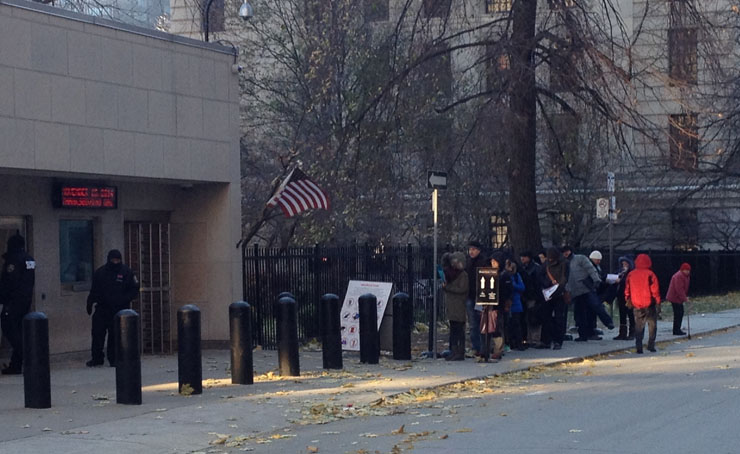Thirty-five-year-old Rocky Martin travelled from his home in Sundre, Alta., to Tijuana, Mexico to get rid of his U.S. citizenship.

And he saved himself about $1,800 by doing so.
Martin, born in Canada, inherited U.S. citizenship from his mother, who registered him as an American born abroad when he was a baby.
“I’d heard rumblings that I was supposed to be filing taxes, but I’d never taken action on it. Then about a year and a half ago, I decided I should look into this a little further,” he said.
He didn’t like what he found.
The first quote he got from a Calgary accounting firm was that he’d need to pay $15,000-$20,000 to become U.S. tax-compliant.
“I didn’t sleep well for days,” he said. “That’s all my life savings, all for the purpose of showing them I don’t owe any taxes.”
After shopping around for accountants, the lowest quote he got was for about $4,000.
But as the Internal Revenue Service prepared to crack down on U.S. citizens abroad who weren’t paying taxes, Martin became uneasy.
“I just didn’t feel comfortable with the bully on the block having this big stick, and threatening to beat me the whole time with it.”
He was thinking of renouncing his U.S. citizenship – his ongoing tax preparation bill was going to be $500 a year.
Thousands of others have made the same decision: According to FBI statistics, 3,109 people had completed the renunciation process this year up to the end of October. That’s about 310 a month. Those statistics don’t capture “relinquishment,” an alternative (and free) path to loss of U.S. citizenship.
READ MORE: How to get rid of your U.S. citizenship
“Some renunciants have reported to consular staff that the cost of preparing and filing U.S. tax returns, even though they may have had no U.S. tax liability, was a factor in their decision,” a State Department official told Global News on condition she not be identified.

Get weekly money news
The pressure on Canadian dual citizens ramped up in February, when Canada signed a deal with the U.S. under the Foreign Account Tax Compliance Act, obliging Canadian banks to give the IRS information on any customer they think is American, including dual citizens. (The CRA acts as an intermediary between the banks and the IRS.)
In late August, the State Department announced it would quadruple the fee people pay to renounce their citizenship – from US$450 to $US2,350. (At the time, a spokesperson told Global News this wasn’t intended to deter renunciants).
For Martin, that was “the last straw.”
“I was just so upset with the whole thing – $2,300 for the privilege of not being American.”
The announcement came Aug. 27, with the fee increase set to take effect Sept. 12.
At the time, there was a months-long waiting list at consulates and embassies in Canada.
“I’d checked with the (U.S. consulate in Calgary) before, and there had been a two- or three-month wait. The one in Toronto was booking into the new year.”
Despite the higher fee, wait times are much longer now: if you want to renounce U.S. citizenship at the Toronto consulate, they can’t take you before September, 2015. If you want to do it at the Ottawa embassy, you’ll wait till next March.
There was no way Martin could renounce his U.S. citizenship here before the price hike.
So he started looking abroad.
Even with the cost of airfare included, Martin calculated he could save money if he flew to whatever U.S. mission would let him renounce before Sept. 12.
“I e-mailed all of the ones in Mexico – Mexico City, Tijuana, a couple of the other ones along the border, the one in Belize. I just kind of hit all the ones in the Caribbean.”
In the end, the U.S. consulates in the Bahamas and Tijuana could make room for him at short notice, and Tijuana was easier to reach. He figures he saved about $1,800.
“It’s one of those things that I wish I feel like I didn’t have to do,” he said. “I feel upset that I had to do that.”
Ottawa files statement of defence in FATCA lawsuit
In the meantime, federal lawyers last week filed a response to a crowdfunded legal challenge to Canadian co-operation with FATCA.
The challenge asserted that the FATCA deal violated the Income Tax Act, the Canada-U.S. tax treaty and the equality provisions of the Charter of Rights.
In its statement of defence, the federal government denied that FATCA violated the Charter, but, “in the alternative … the Impugned Provisions are constitutional because any such infringement is justified in a free and democratic society.”
“The Impugned Provisions are reasonably necessary to achieve the dual goals of relieving Canadian financial institutions and their clients of the potential for crippling tax and commercial consequences of non-compliance with FATCA and furthering Canada’s international commitments to share information for the better administration and enforcement of taxation laws.”
The case may have a court hearing early next year, said David Gruber, the plaintiffs’ lawyer.
Read the statement of defence
Read the statement of claim








Comments